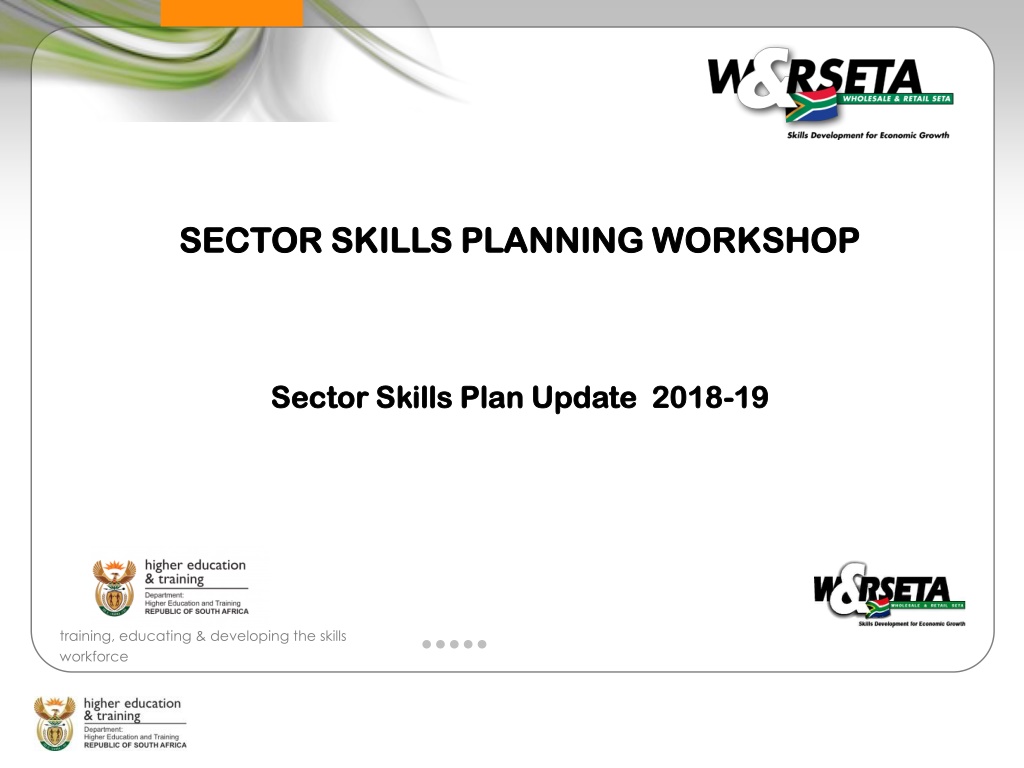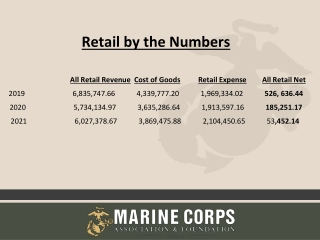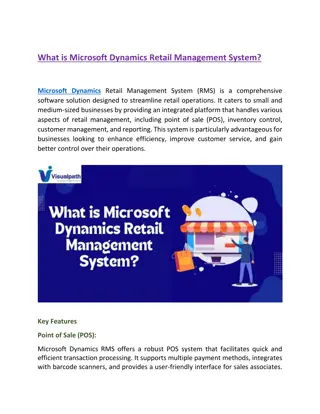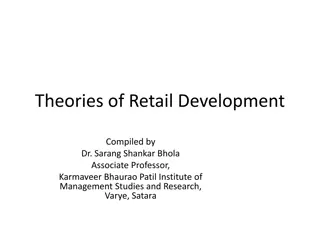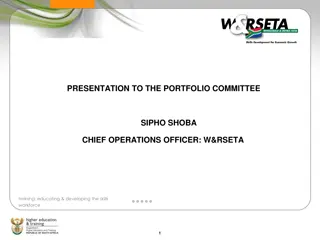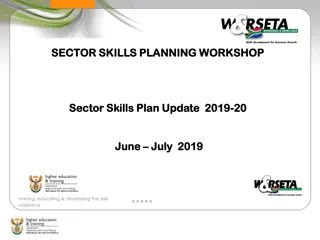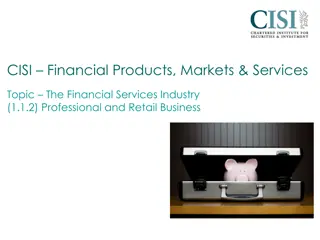Sector Skills Planning Workshop and Retail Sales Growth Analysis
The Sector Skills Planning Workshop discusses the update of the 2018 Sector Skills Plan, research methods for plan development, key role players involved in training and promoting growth, and the year-on-year retail sales growth data analysis for 2016-2017. The workshop emphasizes partnerships, priority actions, and workforce development strategies. Meanwhile, retail sales growth in 2017 shows food retailers outperforming others in a fragile market, with a focus on customer-centric approaches in a challenging economic environment.
- Sector Skills Planning Workshop
- Retail Sales Growth
- Workforce Development
- Training Providers
- Retail Industry
Download Presentation

Please find below an Image/Link to download the presentation.
The content on the website is provided AS IS for your information and personal use only. It may not be sold, licensed, or shared on other websites without obtaining consent from the author. Download presentation by click this link. If you encounter any issues during the download, it is possible that the publisher has removed the file from their server.
E N D
Presentation Transcript
SECTOR SKILLS PLANNING WORKSHOP SECTOR SKILLS PLANNING WORKSHOP Sector Skills Plan Update 2018 Sector Skills Plan Update 2018- -19 19 Image result for dhet south africa training, educating & developing the skills workforce
Structure of Sector Skills Plan Structure of Sector Skills Plan Chapter 3: Chapter 4: Chapter 2: Chapter 5: Chapter 1: Skills Sector Partnerships Key Skills Issues Skills Priority Actions Sector Profile Mismatches training, educating & developing the skills workforce
Research Methods to develop Plan Research Methods to develop Plan Research Design Research Methods & Data Collection Literature Review Regional Workshops Hard-To-Fill Vacancy Survey WSP/ATR Data Analysis Production of scarce, pivotal and critical skills lists W&RSETA SECTOR SKILLS PLAN training, educating & developing the skills workforce
KEY ROLE-PLAYERS Training provider train workforce Government promote growth / employment Wholesaler work with skilled retailers Community employment / training http://images.all-free-download.com/images/graphicthumb/institution_icon_55405.jpg http://ewsystemsinc.com/wp-content/uploads/2016/05/govt-blue-icon-1.png http://netsahara.ru/userfiles/news/medium/957_dostavka-v-dobryanku---vygod.png Related image https://seattle.score.org/sites/default/files/pictures/Small-Business-Wholesale-Retail.png Employers skilled staff http://www.corporateinstallation.net/images/boardroom2.gif https://d13yacurqjgara.cloudfront.net/users/365712/screenshots/1470921/autoshop.png http://catman.global/wp-content/uploads/2015/08/Shopper-Marketing-Icon.png https://s3.amazonaws.com/fetch-website/images/hp-people-icons.jpg Retailers productive staff http://www.losmedanos.edu/its/id_card.png Labour Unions Skilled workers /better compensation Consumers better prices Learners - want skills / better rewards training, educating & developing the skills workforce
Year Year- -on on- -year retail sales growth 2016 year retail sales growth 2016- -2017 2017 Year-on-year retail sales growth in 2016 was weak, arising to 3.7% in May. It declined from June 2016 to October 2016, arising to 3.1% in November 2016. training, educating & developing the skills workforce
What does this mean for wholesale and What does this mean for wholesale and retail in 2017? retail in 2017? Food outperform other retailers, typical of a weak environment Retail spend continues to recover but it remains fragile Retailers focusing on customer and technology as enablers in weak economy environment Overtraded clothing market results in squeezed or flat margins and falling volumes Clothing retailers facing increasing foreign competitor presence GDP Growth 0.8% International Retailers 5.3% Inflation Consumer confidence down SA Junk Status will impact negatively on growth Political uncertainly hurting the sector training, educating & developing the skills workforce
Change Drivers http://www.visionmonday.com/CMSImagesContent/2006/8/45coverart2.jpg TECHNOLOGY Downgrade to junk status http://cdn.bdlive.co.za/FM/images/2306ftRetailPies.jpg Change Drivers African Retail Growth POWER SHIFT TO CONSUMERS http://distinctive-choice.co.za/images/smme2.jpg Downgrade to junk status SMME Developmen t training, educating & developing the skills workforce
Top 28 Hard Top 28 Hard- -To To- -Fill Vacancies Fill Vacancies NO HTF OCCUPATIONS NO OF VACANCIES NO HTF OCCUPATIONS NO OF VACANCIES 1 2 3 4 5 6 7 8 15 16 17 18 19 20 21 22 Customer Services Manager Cook Confectionary Baker Pharmacy Sales Assistant Retail Supervisor Retail Manager (General) Sales and Marketing Manager 277 234 221 154 140 120 115 Retail Buyer Accounts Clerk Visual Merchandiser Stock Clerk / Officer Service Station Manager SHE&Q Practitioner Accountant 61 59 56 53 52 48 44 Operations Manager (non-manufacturing) Chef Retail Planner Butcher Corporate General Manager 92 92 88 87 86 Supply and Distribution Manager Call Centre Operator Plumber Warehouse Manager e-Retail Manager 43 40 40 39 37 9 10 11 12 13 23 24 25 26 27 Sales Representative (Industrial Products) Human Resources Manager 73 67 Bookkeeper IT Manager 36 34 14 28 training, educating & developing the skills workforce
Reasons for Hard Reasons for Hard- -To To- -Fill Vacancies Fill Vacancies training, educating & developing the skills workforce
Major Skills Gaps OCCUPATIONAL CATEGORY FIRST SECOND SKILLS GAP Interpersonal Mentoring & coaching THIRD SKILLS GAP Decision making SKILLS GAP Leadership Managers Interpersonal Communication Professionals Technicians & Associate Professionals Time management Communication Productivity Clerical Support Workers Service & Sales Workers Computer Time management Communication Customer service Communication Product knowledge Product knowledge Craft & Related Trades Workers Customer service Communication Plant & Machine Operators Productivity Numeracy & literacy First aid Product knowledge Elementary Occupations Communication Productivity training, educating & developing the skills workforce
The following is the HTFV list by province: Gauteng GAUTENG OCCUPATION OFO CODE Retail Manager (General) 142103 Retail Supervisor 522201 Sales Assistant (General) 522301 Confectionary Baker 681201 Butcher 681103 Supply and Distribution Manager 132401 Sales and Marketing Manager 122101 Retail Pharmacist 226203 SHEQ Practitioner 226302 Sales Representative 332203 training, educating & developing the skills workforce
Top 10 Pivotal Skills OCCUPATION NO. REQUIRED 3305 1177 389 375 363 320 245 171 164 112 1.Sales Assistant (General) 2.Retail Manager (General) 3.Retail Supervisor 4.Confectionary Baker 5.Retail Pharmacist 6.Butcher 7.Sales & Marketing Manager 8.SHEQ Practitioner 9.Sales Representative 10.Retail Buyer training, educating & developing the skills workforce
Top Occupations by Sector Top Occupations by Sector GENERAL WHOLESALE OCCUPATION Warehouse Manager Logistics Manager Fleet Manager Supply Manager Finance Manager RETAIL: TEXTILES, LEATHER OCCUPATION Retail Manager Retail Buyer Retail Supervisor Visual Merchandiser Sales Assistant (General) CLOTHING, FUEL RETAIL OCCUPATION Service Station Manager Service Station Site Supervisor Administration Manager & Distribution RETAIL: FOOD, BEVERAGE & TOBACCO OCCUPATION Retail Manager Retail Buyer Retail Supervisor Customer Service Manager Butcher Baker E-RETAIL OCCUPATION e-Commerce Manager e-Commerce Planner Web Integrator e-Retail Managers Call Centre Agent training, educating & developing the skills workforce
National Top 10 Scarce (HTFV) National Top 10 Scarce (HTFV) Occupational List Occupational List OCCUPATION OFO CODE 1.Sales Assistant (General) 522301 2.Retail Manager (General) 142103 3.Retail Supervisor 522201 4.Confectionary Baker 681201 5.Retail Pharmacist 226302 6.Butcher 681103 7.Sales & Marketing Manager 122101 8.SHEQ Practitioner 226203 332203 9.Sales Representative 10.Retail Buyer 322301 training, educating & developing the skills workforce
Partnerships RMDP: Addresses challenge of upskilling junior managers / supervisors and team leaders to develop a pipeline of future leaders in the W&R Sector. The shortage of skilled middle managers culminated in Retail Management Development Programme (RMDP). W&RSETA's flagship programme, the ILDP, in its ninth year has benefitted employees from various Wholesale and Retail companies who are positioning retail as a career of choice. TVET College / Retail Simulations Centres: Project is aimed at capacitating colleges to deliver W&RSETA programmes with a two-pronged purpose of fostering collaboration between institutions and the sector and to produce graduates that meet the needs of the industry. Partnership should be forged between the international trade union movements and members should be exposed to their practices. training, educating & developing the skills workforce
Partnerships Partnerships Rural and Cooperatives Development: W&RSETA develops partnerships with rural and previously underprivileged communities. This priority is high on the agenda of government. The aim is to equip rural communities to become active participants of the economy through sustainable job creation and to retain young people in their communities. Rural Community Development: The SETA initiates various projects to benefit unemployed youths, graduates, small businesses and cooperatives. Community Retail Development Programme (CRDP): W&RSETA in partnership with the Tshwane CommunityBusiness Forum trained 400 entrepreneurs and capacitated 20 unemployed graduates in the TshwaneMunicipality. The Rural Areas and Traditional Councils Project: This project benefited 515 learners from the Rharhabe Royal Kingdom (EasternCape), Batlokoa Traditional Council (Free State), Kwandebele Royal Mgibe II (Mpumalanga), Jalamba Traditional Council (Eastern Cape) and Mhlontlo Local. training, educating & developing the skills workforce
W&SESETA Priority Actions SMME AND COOPERATIVES DEVELOPMENT New Training Delivery Models: SMMEs cannot take leave to attend training since they are the business. It is recommended that new training models should be implemented such as coaching, mentoring, on-site training and each one teach one . Support SMEs through a voucher programme. 1 Research: Conduct training needs research on SMME and cooperatives in the sector. Develop a SMME and cooperatives strategy for the sector. YOUTH UNEMPLOYMENT Career guidance 2 Capacity development Provision of Workplace Experience & Work Readiness Opportunities Rural Youth Development training, educating & developing the skills workforce
W&RSETA Priority Actions W&RSETA Priority Actions HARD-TO-FILL VACANCIES (HTFVs) AND CRITICAL SKILLS Identification of critical and occupational shortages is a key deliverable of the SSP. This is necessary to ensure that the work of the SETA responds to the changing, demand-side needs of the Sector. It also ensures that an investment in skills development is effective and efficient as priority skills are addressed. The identification of occupational shortages is also necessary to inform DHET s National List of Occupations in High Demand. 3 STAKEHOLDER ENGAGEMENT o Initiate regional forums in all regions to keep stakeholders abreast of SETA activities to promote skills development. 2 3 workshops per year. 4 o Develop a call centre to ensure stakeholder queries are addressed timeously. o Conduct howto workshops at regional forums. o Conduct an annual stakeholder satisfaction survey internally and externally. training, educating & developing the skills workforce
W&RSETA Priority Actions W&RSETA Priority Actions SUPPORTING PEOPLE WITH DISABILITIES (PWD) A voucher and bursary scheme should be implemented for PWD to access training in the sector. An internship programme should be started to assist PWD. Companies should be encouraged to employ graduates Who have disabilities. 5 TRADE UNION CAPACITY-BUILDING Project to build capacity of employees in trade unions along similar to ILDP and RMDP but focused on pertinent labour issues. Programme to focus beyond shop stewards training. Partnerships should be forged between the international trade union movements and members should be exposed to their practices. 6 training, educating & developing the skills workforce
MEASURES TO SUPPORT NATIONAL STRATEGIES AND PLANS 7 W&RSETA should convene a workshop to unpack NDP and IPAP. The outcomes of the workshop should be a set of actions to support these initiatives. Convene a meeting with the DTI (IPAP) and National Planning Commission (NDP) to engage on the outcomes of the workshop. Develop a programme of action to align the work of the SETA to NDP and IPAP in consultation with these entities. training, educating & developing the skills workforce
THANK YOU training, educating & developing the skills workforce 21
